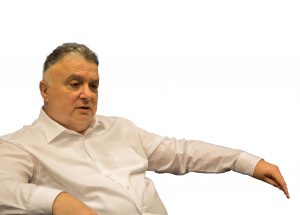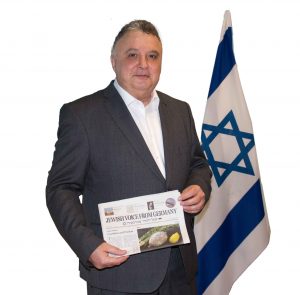“Israel is a secure homeland for the Jewish people,” states Jeremy Issacharoff, Israel’s ambassador in Germany, in an exclusive interview with JVG. He says that the Israeli-German relationship is stable. But Issacharoff is critical of the German public viewing the Middle East largely through the lens of the Israeli-Palestinian conflict. This means overlooking the threat Iran poses to Israel…

JVG
Mazal tov on Israel’s 70th birthday. What are Israel’s greatest achievements?
Israel has not only established the state but also created a vibrant and secure homeland for the Jewish people – for those living in Israel as well for Jewish people in any part of the world. Our country has very few natural resources, so we developed our own human resources. We succeeded in bringing people from all over the world together and created a cohesive society. Israel is a functioning stable democracy. We have developed enormous expertise in agriculture, in science and high-tech. We are not only trying to be a good country for ourselves but also try to provide as much assistance and expertise as we can to other countries too. And last but not least, we have also succeeded in reconstituting Hebrew as a living language.
But what about peace?
Israel has always been eager to be a part of the neighborhood we live in. Whenever a genuine opportunity for peace showed itself, we have seized this opportunity and fulfilled it to the best of our ability. When after the Yom Kippur War in 1973, the worst war Israel ever underwent, Egypt’s president Sadat, the architect of that war, offered to come to Jerusalem, people were out on the streets welcoming him. The peace treaty with Egypt has now lasted for forty years and it is a strategic pillar of our national security. Security challenges will always remain. Israel is very much at the forefront of fighting terrorism. Some of the achievements of Israel in this respect have been very much envied by other countries in the world. In Israel, we have had every type of level of terrorism at every level of intensity. The Middle East is a fundamentally unstable area. Israel has coped with the opportunities but we have also dealt with the dangers and the vast majority of Israelis are still interested in broadening the process of peace with our Arab neighbors.
Things look quite different on the Arab streets where anti-Israel sentiments are raging…
Whilst we have been able to have very good relations with our Arab neighbors a lot of the time, this has been discreet, it happens far away from the public eye. I think sometimes some Arab countries have not yet understood just how much the role of Israel in the area has changed in ways that benefits them directly. Now, if Israel, Egypt and Jordan are cooperating against elements in the area like DAESH (IS) and other terrorist groups, this is not necessarily seen and felt in the public, but it is there.
Can you imagine regular relations between Israel and Saudi Arabia?
To see a country like Saudi Arabia and a country like Israel bridging gaps and having normal relations to me seems natural, desirable and something that could be ultimately very strong. The convergence of interests between the moderate Arab world and Israel has never been greater than it has been over the last couple of years. And this could happen with many more Arab countries, not just Saudi Arabia.
In the 1970s and 80s, German-Israeli relations were excellent … Today, if you look at public opinion, Israel has a very low profile when it comes to a good image…
First of all, I think it is important that we explain and show to the people in Germany that Israel’s role in the area has changed. Often people here just focus on Israelis and Palestinians, the settlements, the two state solution, yes or no … They are not seeing the entire Middle East, they are not seeing the real picture of what’s going on in the region. I don’t think it is yet known sufficiently in Germany what we are doing [in humanitarian aid] in our own modest way on the border with Syria. But let’s also talk about Hezbollah in Lebanon which is a massive military threat to Israel. Let’s talk about the situation in Syria with the Russian presence that has developed there. Let’s talk about the challenges to the area as a whole emanating from Iran, its involvements in Syria. For sure, Iran is not in Syria to stabilize it, it is not there to help the Syrian people – all these are the pressing issues.
I hear that some people consider the settlements in the West Bank as the biggest problem in the Middle East – but this seems to me like a picture some people want to see, it is not much connected to reality.
Ten years ago, Angela Merkel announced in the Knesset in Jerusalem that Israel’s security is a vital German interest and non-negotiable. Was this not precisely what happened in the negotiations on the nuclear deal with Iran in which Germany took part, a deal in which Israel’s right to existence is not even mentioned…
What Chancellor Merkel said in the Knesset about Germany’s historical responsibility and its commitment to our country’s national security is a cornerstone of her policy towards Israel. She has been a very major leader in German thinking on that issue and generally she has remained faithful to that commitment. We had very strong frank ongoing discussions with the German government throughout the entire negotiations and this exchange was very important to us. My impression is that it is understood also in Germany that a country that is developing intercontinental ballistic missiles is not just an Israeli problem or an Arab problem, it is also a German and a NATO problem.
Germany was one of the countries voting against the resolution to recognize Jerusalem as Israel’s capital…
Relationships between any two countries if they are serious, vibrant, living, breathing relationships they have elements where you agree and they have elements where you disagree…

JVG
North Korea is negotiating with South Korea… Can you imagine a situation where an Israeli delegation visits Tehran – or the other way round?
We have no quarrel with the Iranian people. In fact, we feel for them that they have to live in a regime that denies rights to women, that denies essential human rights, freedom of the press, does not recognize gay rights and executes minors. From that point of view, there is a great deal of sympathy from Israel towards the Iranian people and what they are living under. There is also a very strong memory in the minds of Israelis regarding the once cordial relations between Israel and Iran under the Shah. I can’t see how the regime in Tehran is going to sustain itself, a regime which believes that within several years Israel will not be able to sustain itself – believe me, Israel is a much more vibrant, stronger country that knows how to defend itself. The regime in Teheran should understand that it would be better for it to find someone else to mess with their security rather than with Israel. I think that in the end the regime will change and our countries can return to a whole different relationship.
Ariel Sharon decided to disengage from Gaza. Can you imagine a scenario where an Israeli government would disengage from the West Bank, Judea and Shomron?
No. This is not a viable option. In my view, the only option will be a political settlement that will fully take into account primarily Israel’s security interests.
Not for the next 70, but the next ten years – your wishes for Israel?
On the national level I think that we must continue to push towards greater regional understanding between Israel and the Arab countries. This could be a vital component in ensuring a possible political settlement between Israelis and the Palestinians. A very major challenge will be to prevail over the more destabilizing and radical elements in the region. If we are able to make progress on that we can also make progress in bringing more people from abroad making Aliyah to Israel. Tourism is also a vital component. We have had a record number of visitors last year and with greater stability, even more people would come to visit Israel. Things can change very quickly, people-to-people relations, confidence grows. This could also be a very vital element in creating this new kind of reality: Making our area of the world not be seen as an area of despair, but as an area of hope – Hatikva.■
Ambassador Issacharoff talked to JVG-editors Elisabeth Neu
and Rafael Seligmann at the Israeli embassy in Berlin
